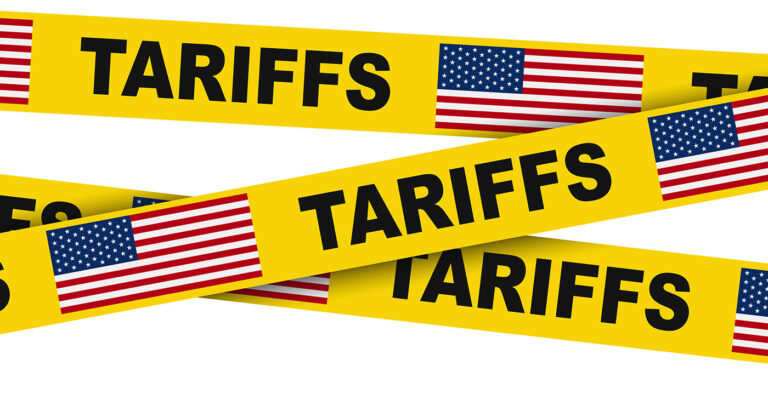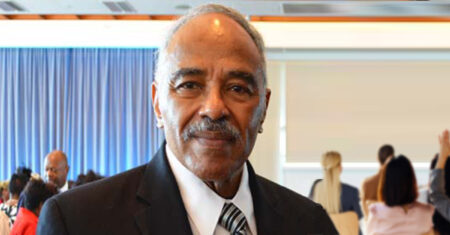By Stacy M. Brown
BlackPressUSA.com Senior National Correspondent
As the Trump administration’s sweeping tariffs take effect, Mica Whitfield, Co-President and CEO of 9to5, National Association of Working Women, warns that the policies are another economic blow to already vulnerable communities—especially Black women. “These tariffs are just a tax on working people, especially working women,” Whitfield said on BlackPressUSA.com’s Let It Be Known News show. “They’re making decisions at the gas pump about groceries while rent is already sky-high. One in three single mothers is already living in poverty—tariffs push them closer to the edge.” Whitfield, who leads 9to5’s mission for economic justice for working women and non-binary people of color, says these new economic burdens should be viewed through a gendered lens. She compares them to the long-standing “pink tax”—the added cost women pay for everyday items like razors and personal care products—only much worse.
“We can think of it as the pink tariff,” she said. “Women already pay more with smaller financial margins. These tariffs just stack on top of that.” In practical terms, the price hikes caused by tariffs reach deep into women’s lives, especially for those working in care industries or running small businesses. From higher prices on diapers and cleaning supplies for childcare providers to increased costs for raw materials for Black-owned haircare brands, Whitfield said the domino effect is widespread. “Black women are the fastest growing group of entrepreneurs, but they’re already struggling with access to capital,” she said. “Now they’re forced to find new sources for packaging or ingredients just to stay afloat. This could close doors for so many of them.” She said the same goes for caregivers. “We work with Black and Brown women who provide childcare in their homes or run small centers. Tariffs raise prices for the essentials they need—wipes, toys, and cleaning supplies—which are already expensive. This is the kind of pressure that can bring the whole house down,” Whitfield asserted.
As Americans suffer from the fallout, states like California, under Governor Gavin Newsom, have floated the idea of independent trade negotiations. However, Whitfield, who is based in Georgia, noted that such state-level innovation isn’t possible everywhere. “Red states have been slow to respond to the administration,” she said. “Our folks in Georgia and Wisconsin are doing the resistance work on the ground, but it’s tough. We’re watching states like California try to hold the line while others leave working people to carry the burden.” Whitfield says part of her organization’s work is to make economic issues like tariffs more accessible. “Tariffs sound abstract, but they’re not. They’re a working people’s issue,” she said. “We’ve estimated they’ll cost the average family about $3,800 a year—around $300 a month. That’s a real hit.” She also worries about the Trump administration’s proposed cuts to programs like Head Start, which she said would devastate communities of color. “These programs are already deeply underfunded. Millions of children who qualify don’t get access,” she said. “Gutting Head Start means more kids without early education and more parents, mostly mothers—unable to work. It’s a domino effect that sets back another generation of Black and Brown children.”
Founded in Boston over 50 years ago, 9to5 inspired the classic film Nine to Five, starring Dolly Parton, Jane Fonda, and Lily Tomlin. Today, the organization operates chapters in Colorado, Wisconsin, and Georgia, organizing working women and non-binary people around issues like childcare, paid leave, workplace harassment, and economic justice.
Whitfield and her Co-President, Ashley Panelli, are the first Black women to lead the organization. “Our roots are in worker justice, but our focus now is specifically on those doing low-wage, care-based jobs—mostly Black and Brown women,” she said. Though federal wins have grown more elusive, 9to5 continues to build power locally, pushing for change through city commissions, public service boards, and school boards. “In Southwest Georgia, people were paying power bills as high as their rent,” Whitfield said. “So, we started organizing around public service commissioner races and utility boards—things people didn’t realize directly impact their lives.” When asked how she got into this work, Whitfield traced her activism back to the Million Woman March in Philadelphia, which she attended as a preteen. Her path continued through public health and maternal justice work before she joined 9to5. “I worked with newly diagnosed women living with HIV, many who found out their status while pregnant,” she said. “The intersection between economic stability and health became clear to me. From zip code to paycheck, it all impacts Black women’s well-being.” Now, she’s calling on the public to see tariffs for what they are: taxes that hit the most vulnerable the hardest. “This isn’t abstract,” Whitfield said. “It’s going to impact your pockets.”
For more information, visit 9to5.org.






